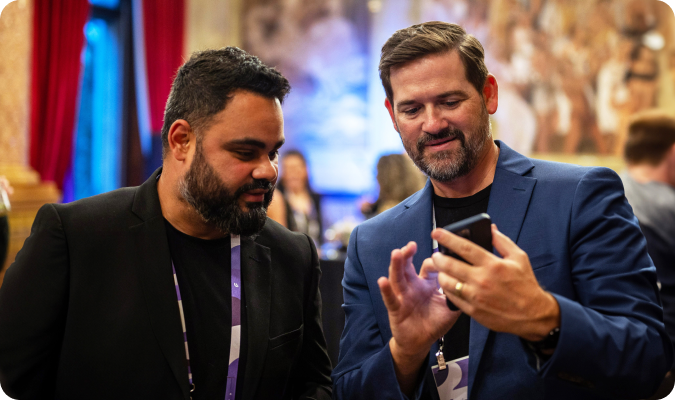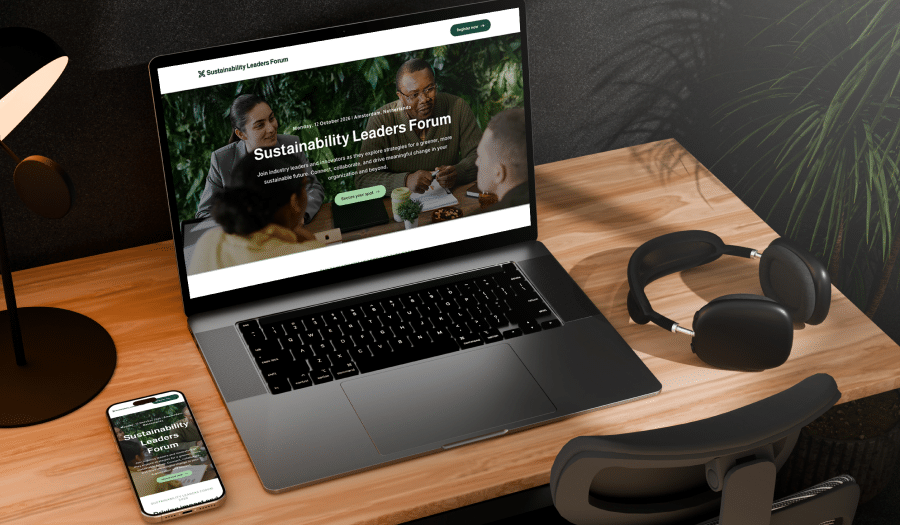
Organizing a seamless event, whether it’s a corporate conference, an association meeting, or a large hybrid gathering, is no small feat. If you’ve ever juggled vendor coordination, last-minute schedule changes, or struggled with keeping attendees engaged, you know the pressure firsthand.
Without a skilled event management team, these challenges can quickly turn into chaos, impacting your event’s success and your reputation as a planner.
In this EventsAir article, we’ll explain why having a dedicated event management team is essential to delivering flawless events. We’ll also guide you through building a team that’s prepared to handle every phase of your event.
What is an event management team?
An event management team is a group of individuals with different skill sets dedicated to planning, organizing, and executing events. They work behind the scenes to make sure tasks are handled, details aren’t missed, and everything stays on track.
Their focus is execution and day-to-day operations, bringing all the moving parts together to make the event run smoothly.
Why do you need a dedicated event management team?
Strategic planning and coordination
A strong event management team ensures every detail of the event aligns with your goals. Whether you’re aiming to build brand awareness, create networking opportunities, or celebrate a key milestone, they turn ideas into a clear plan and keep things running according to the timeline.
Key tasks often include:
- Setting schedules and deadlines
- Booking venues and managing vendors
- Keeping everyone involved on the same page
Their job is to bring everything together so the event runs smoothly from start to finish.
Budget management
Handling event finances requires more than just number-crunching. An experienced team helps you get the most from your budget while avoiding surprise costs. They usually take care of:
- Creating a detailed spending plan
- Finding the best deals with vendors
- Tracking costs as the event comes together
This helps keep spending under control while still delivering a high-quality event.
Marketing and promotion
An event’s success depends heavily on getting the right people through the door and making them excited to attend. A dedicated team develops multi-channel marketing strategies designed to generate buzz and sustain engagement, often using platforms like EventsAir to streamline registration, automate communications, and track campaign performance.
Their work often includes:
- Crafting social media and email campaigns
- Managing press releases and influencer outreach
- Optimizing registration and promotional platforms
The goal is not just attendance, but the right kind of attendance, aligned with the event’s purpose and audience.
Risk mitigation
Even the most well-planned event can face last-minute surprises. That’s why good teams plan ahead to reduce risk. They think through what might go wrong and have backup plans ready. This can include:
- Identifying vulnerabilities in logistics, safety, and compliance
- Developing contingency plans for key scenarios
- Coordinating insurance and emergency protocols
This kind of planning helps protect your event, your guests, and your brand.
Attendee experience
A great event isn’t just about good planning; it’s also about how people feel while they’re there. An event management team makes sure the experience is smooth, enjoyable, and memorable from start to finish. They focus on:
- Creating clear signage and easy check-ins
- Planning thoughtful layouts and schedules
- Offering help and quick solutions on-site
Paying attention to the small details helps attendees feel welcome and engaged and makes them more likely to come back next time.
Post-event analysis
What happens after the event is just as important as what happens during it. A smart team looks back to see what went well and what could be better, leveraging post-event data and reporting tools from platforms like EventsAir to measure success, gather attendee feedback, and uncover insights for future improvements.

This reflective stage closes the loop and helps to improve and get more value from every event organized.
How to assemble an effective event management team
1. Define event objectives and scope
Before building your team, you need to know what they’re working toward. Clear goals and a well-defined scope give your team direction and help shape every part of the planning process.
Here’s a simple but effective way to do that:
- Start by asking what success looks like. Are you trying to generate leads, drive awareness, or deliver a great experience for loyal customers?
- Once you’ve nailed down the “why,” you can define the “what”, format, audience size, duration, and budget.
With this foundation in place, you’ll be better equipped to decide how many people you need and what roles they’ll fill.
2. Determine required roles and team structure
Once your goals are clear, it’s time to figure out who you need to make it all happen. Every event requires a mix of skills, from organizing logistics to promoting the event and managing finances.
Typical roles include:
- Event manager
- Logistics coordinator
- Marketing lead
- Finance manager
- Tech support
TIP: Your team’s size and structure should scale with the event. A small workshop may need just a few people, while a large conference could require a full department. To help you map out roles and responsibilities efficiently, download our free all-inclusive event planning checklist.

3. Recruit and select team members
Now that you know the roles you need, it’s time to find the right people to fill them. Depending on the scope, you might recruit from within your organization or look externally for specialized skills.
Start by identifying candidates with experience in events or relevant functional areas. Then evaluate their ability to work under pressure, solve problems, and collaborate with others.
Whether you’re hiring full-time staff, freelancers, or volunteers, choose people who align with your event goals and work culture. The right mix of talent sets the tone for how effectively your team will perform.
4. Assign roles and responsibilities
With your team in place, everyone needs to know exactly what they’re responsible for. Clear role assignments help avoid confusion, prevent tasks from falling through the cracks, and keep things moving smoothly.
Start by outlining what each role covers, along with the skills needed to do the job well. Here’s a simple breakdown:
| Role | Responsibilities | Skills required |
| Event Manager | Oversee overall planning, coordinate teams, ensure goals are met | Leadership, multitasking, communication |
| Logistics Coordinator | Handle venues, vendor management, scheduling, and on-site setup | Organization, time management, negotiation |
| Marketing Lead | Develop and execute promotional strategies across all channels | Creativity, digital marketing, audience targeting |
| Finance Manager | Create and manage budgets, track expenses, ensure financial compliance | Budgeting, financial analysis, attention to detail |
| Technical Lead | Manage AV, live streaming, digital tools, and platform support | Tech proficiency, troubleshooting, calm under pressure |
| Guest Services Lead | Manage registration, answer attendee questions, coordinate support staff | Customer service, problem-solving, interpersonal skills |
Once roles are assigned, set expectations. Make sure each team member understands their responsibilities, deadlines, and who to communicate with.
5. Establish communication and workflow processes
Even the best team won’t succeed without clear communication. To keep everything on track, you’ll need a plan for how information flows and how work gets done.
Start by setting up the basics:
- Choose tools for messaging, file sharing, and task tracking
- Schedule regular check-ins, whether it’s weekly team meetings, quick daily updates, or milestone reviews
- Document key decisions and share updates in one central location
Next, define workflows. Who approves what? What’s the process for escalating issues? Clear processes reduce confusion and help your team respond quickly when things change, because they will.
Smooth communication is what turns a group of individuals into a well-functioning team.
What’s next after assembling your event management team?
Once your team is ready, the next step is giving them the tools to succeed. That’s where we come in.
At EventsAir, we help event teams plan, manage, and deliver standout experiences, whether your event is in-person, virtual, or hybrid. Our all-in-one event management platform takes care of everything behind the scenes, thanks to our comprehensive suite of features:
- End-to-end planning: From budgeting and registration to agenda management and speaker coordination, EventsAir streamlines every aspect of event planning.
- Attendee engagement: Enhance participant experience with interactive tools like live polling, Q&A sessions, gamification, and networking opportunities.
- Real-time analytics: Access over 150 customizable reports to monitor event performance and gather actionable insights.
- Integrated solutions: Use built-in features such as payment processing, mobile event apps, and check-in systems to simplify operations.
Having powered more than 350,000 events worldwide, we have what your team needs to simplify the process and run smoother events, start to finish.
Request a demo today to see our platform in action.
Best Practice | Event Planning & Management
See EventsAir in action
Discover why 12,000+ event professionals trust EventsAir to deliver effortless events, every time.




